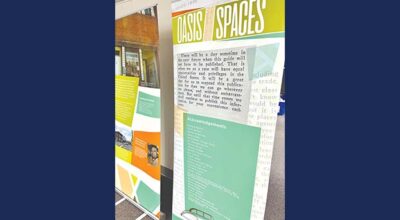Estuarium hosts sea-turtle program
Published 5:00 pm Thursday, June 20, 2013
Volunteers with Emerald Isle’s sea turtle-protection program visited the North Carolina Estuarium this week to share details of the program with area residents.
They also educated those residents about sea turtles that visit area waters and lay eggs on beaches along North Carolina’s coast. Five species of sea turtles — loggerhead, green, leatherback, Kemp’s Ridley and hawksbill — lay their eggs on beaches from the beginning of May to the end of August.
Sea turtles are protected by federal law, specifically the Endangered Species Act.
Jim Craig, one of the program’s two coordinators an a 10-year volunteer, and Kevin Geraghty, a program volunteer for six years, explained the program and provided information about the sea turtles during a presentation at the Estuarium.
Emerald Isle, a town near Morehead City, Atlantic Beach and Swansboro and on the Atlantic Ocean, has ordinances in place that protect the sea turtles and the nests where the female turtles lay their eggs. Violations of those ordinances may result in fines and/or jail time.
Those ordinances and established practices are in place to prevent people from disturbing the female turtles when they come ashore to lay eggs, those eggs after they are laid and the baby turtles after they hatch. Program volunteers, in some cases, move the eggs to safer locations to protect them from high tides and people and vehicles on the beach.
“We’ve been doing this program at Emerald Isle for about 25 years. We have about 80 volunteers. We have 13 ½ miles of beach that we have to examine every morning from May 1 to the end of August,” Craig said.
A female sea turtle lays about 110 eggs per nest, Craig said. When the baby turtles hatch and leave the nest, that’s called a “boil,” he said.
“What we have learned recently is that they have some means of transmission, inner information or who knows what it is. They can synchronize so that they all come out at once,” Craig said.
Temperatures determine what gender a nest of eggs will become, he said. Warmer temperatures produce female sea turtles, with colder temperatures producing male sea turtles. Once male, baby sea turtles enter the water, they never return to land, Craig said.
The program uses transmitters attached to the female sea turtles and DNA samples taken from the female sea turtles to track their movement, Geraghty said. DNA samples from other sea turtles are compared to determine if one sea turtle is related to another. Those samples and data provided by the transmitters allows researchers to determine where a specific female sea turtle travels to lay its eggs and where her female offspring are laying their eggs, Geraghty said.
Female sea turtles begin laying eggs about the time they are 20 years old, he noted.
Some female sea turtles return to the same beach each time they lay eggs, but others may lay eggs at several locations along the coasts of several states, Geraghty noted.
Emerald Isle’s program receives no money from outside sources, Craig said.
For more information about the program, visit http://www.emeraldisle-nc.org/turtles/updates.htm.






